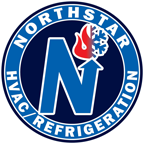Best Practices for Maintaining Refrigeration Equipment
Written by Ed Rice
At Northstar Refrigeration, we know firsthand the importance of regular maintenance for large-scale industrial refrigeration units. Preventative maintenance is essential for ensuring reliability, performance, and efficiency, ultimately extending the lifespan of your equipment and increasing your return on investment. Here are some best practices to keep your refrigeration systems running at their best.
Daily Checks: Industrial Chillers
Clean Equipment: Promptly clean any spills to prevent odors and mold growth.
Verify Settings: Check temperature and defrost settings daily to avoid icing and excess energy use.
Inspect Seals: Look for leaks and repair as necessary to maintain efficiency.
Turn Off Lights: Ensure unit lighting is off when not in use to reduce heat load.
Monitor Performance: Track performance data to identify and fix emerging issues early.
Noise Inspection: Listen for unusual noises that could indicate potential problems.
Check Drain Pan: Empty as needed to prevent overflow and maintain hygiene.
Periodic Maintenance Activities: Performed In-House or by a Professional
Clean Heat Exchangers: Inspect and clean condenser and evaporator heat exchangers monthly.
Clean Fan Blades: Clean and inspect fan blades monthly to ensure efficient operation.
Defrost Unit: Follow the manufacturer’s defrost recommendations to avoid overworking the unit.
Maintenance Activities by a Professional
Calibration
Ensure Controls Accuracy: Proper calibration of controls is crucial for energy efficiency and performance.
Evaporators
Valve Adjustment: Regularly check and adjust valves.
Motor and Control Checks: Inspect motors, controls, and fan blades.
Gasket Inspection: Ensure gaskets are in good condition.
Drain Line Check: Keep drain lines free from obstructions.
Defrost Heater Inspection: Regularly check defrost heaters.
Compressors
Control Operation: Verify control operations.
Oil Level and Quality: Check and test compressor oil.
Line and Hose Inspection: Inspect refrigerant, capillary, and superheat lines.
Refrigerant Levels: Maintain proper refrigerant levels.
Valve and Cover Checks: Ensure all valve caps and unit covers are in place.
Filter and Strainer Inspection: Regularly replace filters and strainers.
Gasket and Seal Checks: Inspect and replace as necessary.
Monitor Vibrations: Regularly check for unusual vibrations and temperatures.
Electrical Component Checks: Inspect and tighten electrical connections.
Condensers
Fan Operation: Ensure proper fan operation and lubrication.
Leak Inspection: Check for refrigerant leaks.
Heat Exchanger Maintenance: Descale and clean condenser water tubes as needed.
Water Pumps
Leak Inspection: Regularly check for leaks.
Bearing Maintenance: Re-grease bearings and check alignment.
Gasket and Seal Replacement: Replace gaskets and mechanical seals as needed.
Impeller and Shaft Inspection: Inspect and adjust as needed.
Conclusion
Regular maintenance is crucial for the longevity and efficiency of your refrigeration systems. By following these best practices and scheduling regular professional check-ups, you can prevent common issues, reduce energy costs, and ensure best performance. At Northstar Refrigeration, we’re here to help you with all your maintenance needs, ensuring your systems run smoothly year-round. Contact us today to schedule maintenance for your refrigeration systems.
(508) 888-3692
Edward Rice
Director of Marketing
Northstar Refrigeration, Inc.
95 Camelot Drive, Unit 1 | Plymouth, MA 02360
erice@northstarhvacr.com | www.northstarhvacr.com
p: (508) 888-3692 x115 |
m: (508) 561-8638



